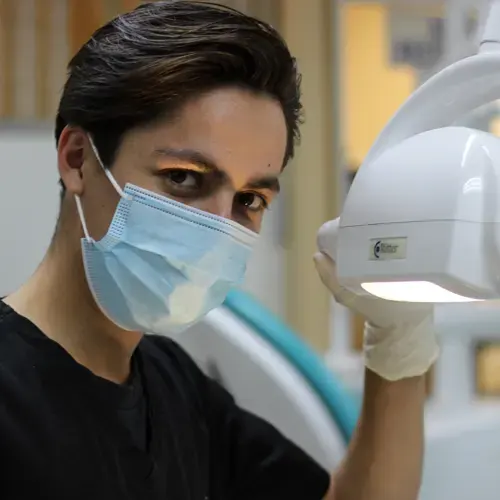Preventive Dentistry

Preventive Dentistry
Problems in your mouth can be linked to health problems in other parts of your body.
Discussing them with us will help prevent them from generating further damage to your overall health. If you have other diseases, these also can affect the health of your mouth and change the way you smile.
We recommend that our patients, visit our office at least twice each year, to ensure their optimal oral health, and to help avoid serious and costly problems. In certain cases, we may even recommend 3 or 4 visits per year, in order to properly treat conditions that require more regular attention. Maintaining a regular appointment schedule with your dentist, isn't just good for your teeth, it's an important part of your overall health.
Why is it important that I visit my dentist every 6 months ?
Well, you might be surprised to learn the extent of what really goes on during your regular check-up. In addition to cleaning and polishing all the visible and hidden surfaces of your teeth, we also check for many other potential oral
diseases. Must common would be Tooth Decay (cavities), Periodontal (gum) disease, Oral Cancer, etc.

Dental cavities
We are all at risk of tooth decay, or cavities. Bacteria (germs) that naturally live in our mouths use sugar in food and produces acids. Over time, the acids destroy the outside layer of your teeth called enamel. When the protective outside layer is broken, bacteria can damage the tooth and if not treated can create large(r) cavities that can produce severe pain or cause more extreme effects where you can loose your tooth is left untreated for long time. On your regular checkups in our dental office, we are screening for any damage that can lead to cavities and if treated right away, you avoid future troubles and discomfort. Keep in mind that the more fillings, crowns, bridges you have, you need to pay a lot more attention to these areas since
bacteria can hide much better in pockets now available at the edges between your own teeth and the added cosmetic elements. Also receding gums caused by hardened brushing over time, will expose parts of the tooth below the gum line that do not have the same protective layer and your risk of cavities is a lot higher in these areas. Our professional dental staff will screen for these signs as well and advice you on modifying the tooth brushing techniques and tools.
Gum diseases
Gum disease as one of the most common oral health problems is also one that can be prevented with constant care and reversed if discovered and treated in the early stages. Gum disease is caused by bacteria that forms every day as plaque and is sticky to your teeth. Plaque it is clear and forms mostly at the gum line (where your teeth and gum meet). If not cleaned, will turn into calculus or tartar, which in time can cause infections on your gums. In the early stages this is called gingivitis. When tartar has formed, can not be cleaned by regular brushing and flossing, a more professional cleaning may be required. If no measures are taken at this time, the infection continue to develop attacking the gums more aggressively as well as the bone that holds your teeth in place. With loss of bone teeth may become loose and in danger of loosing their strength. This is not a process that will develop in a couple of days, it takes months if not years, but if infection has reached the bone structure then the treatment becomes more difficult and less successful.
Visit your dentist on a regular basis for your cleaning and do not forget to brush and floss daily.
Oral cancer
This cancer can affect any part of the mouth and is a disease resulting from abnormal cell growth in the mouth, lips, tongue or throat. People over the age of 45 are mostly at risk. The cause of oral cancer is still unknown but risk factors are tobacco, alcohol, sun exposure, poor diets, etc. On your regular checkups as well as anytime you visit our office for other type of treatments, we will screen you for oral cancer. Discovered in the early stages gives you a better chance in stopping the disease from spreading and apply known treatments with better chances of success.
Burning mouth
Burning mouth syndrome is the medical term for ongoing (chronic) or recurrent burning in the mouth without an obvious cause. This discomfort may affect the tongue, gums, lips, inside of your cheeks, roof of your mouth (palate) or widespread areas of your whole mouth. The burning sensation can be severe, as if you scalded your mouth. Burning mouth syndrome usually appears suddenly, but it can develop gradually over time. Unfortunately, the specific cause often can't be determined. Although that makes treatment more challenging, working closely with your health care team can help you reduce symptoms.
Cold sores
Cold sores — also called fever blisters — are a common viral infection. They are tiny, fluid-filled blisters on and around your lips. These blisters are often grouped together in patches. After the blisters break, a crust forms over the resulting sore. Cold sores usually heal in two to four weeks without leaving a scar. Cold sores spread from person to person by close contact, such as kissing. They're caused by a herpes simplex virus (HSV-1) closely related to the one that causes genital herpes (HSV-2). Both of these viruses can affect your mouth or genitals and can be spread by oral sex. Cold sores are contagious even if you don't see the sores. There's no cure for HSV infection, and the blisters may return. Antiviral medications can help cold sores heal more quickly and may reduce how often they return.
Canker sores
Canker sores, also called aphthous ulcers, are small, shallow lesions that develop on the soft tissues in your mouth or at the base of your gums. Unlike cold sores, canker sores don't occur on the surface of your lips and they aren't contagious. They can be painful, however, and can make eating and talking difficult. Most canker sores go away on their own in a week or two.
Thrush or oral candidiasis
Oral thrush is a condition in which the fungus Candida albicans accumulates on the lining of your mouth. Candida is a normal organism in your mouth, but sometimes it can overgrow and cause symptoms. Oral thrush causes creamy white lesions, usually on your tongue or inner cheeks. Sometimes oral thrush may spread to the roof of your mouth, your gums or tonsils, or the back of your throat. Although oral thrush can affect anyone, it's more likely to occur in babies and older adults because they have reduced immunity; in other people with suppressed immune systems or certain health conditions; or people who take certain medications. Oral thrush is a minor problem if you're healthy, but if you have a weakened immune system, symptoms may be more severe and difficult to control.
Dry mouth or xerostomia
Dry mouth refers to a condition in which the salivary glands in your mouth don't make enough saliva to keep your mouth wet. Dry mouth is often due to the side effect of certain medications or aging issues or as a result of radiation therapy for cancer. Less often, dry mouth may be caused by a condition that directly affects the salivary glands.
Saliva helps prevent tooth decay by neutralizing acids produced by bacteria, limiting bacterial growth and washing away food particles. Saliva also enhances your ability to taste and makes it easier to chew and swallow. In addition, enzymes in saliva aid in digestion. Decreased saliva and dry mouth can range from being merely a nuisance to something that has a major impact on your general health and the health of your teeth and gums, as well as your appetite and enjoyment of food.
Bad breath or called halitosis
This can be caused by poor oral hygiene, gum disease, dry mouth, digestive problems, etc
Beers with the boys, a girls’ night out over wine, an after work happy hour. These are all a recipe for fun, but your partner may notice something less fun in the morning—your bad breath.
Unlike most liquids, alcohol dries your mouth out which aids bacteria to cause bad breath, also known medically as halitosis. Caffeinated beverages can do this too, and so can cigarettes and spicy food. This prevents your natural mouth-cleaning agent, saliva, from doing its job. When saliva’s not on patrol, bacteria thrive, leaving your mouth less than minty-fresh.